University Learning Reflection: Gibbs Model and Future Goals
VerifiedAdded on 2023/06/18
|6
|1399
|417
Essay
AI Summary
This essay provides a reflection on a student's learning experience during a university course, utilizing the Gibbs reflective model to analyze the various stages of the learning process. The student describes their initial hesitation due to communication problems and how they overcame this challenge with the support of team members and the assessor. The evaluation stage highlights the development of essential skills, while also acknowledging the student's introverted nature as a barrier to clearing doubts. The analysis identifies issues with task division and the importance of proper planning. The conclusion emphasizes the need for proactive decision-making and clear communication in group tasks. Furthermore, the student reflects on future challenges related to communication, time management, and critical thinking, expressing expectations for developing team-building skills and improving problem-solving abilities. The essay concludes by summarizing the identified strengths and weaknesses, future challenges, and expectations for continuous growth, with the aim of excelling in future projects.
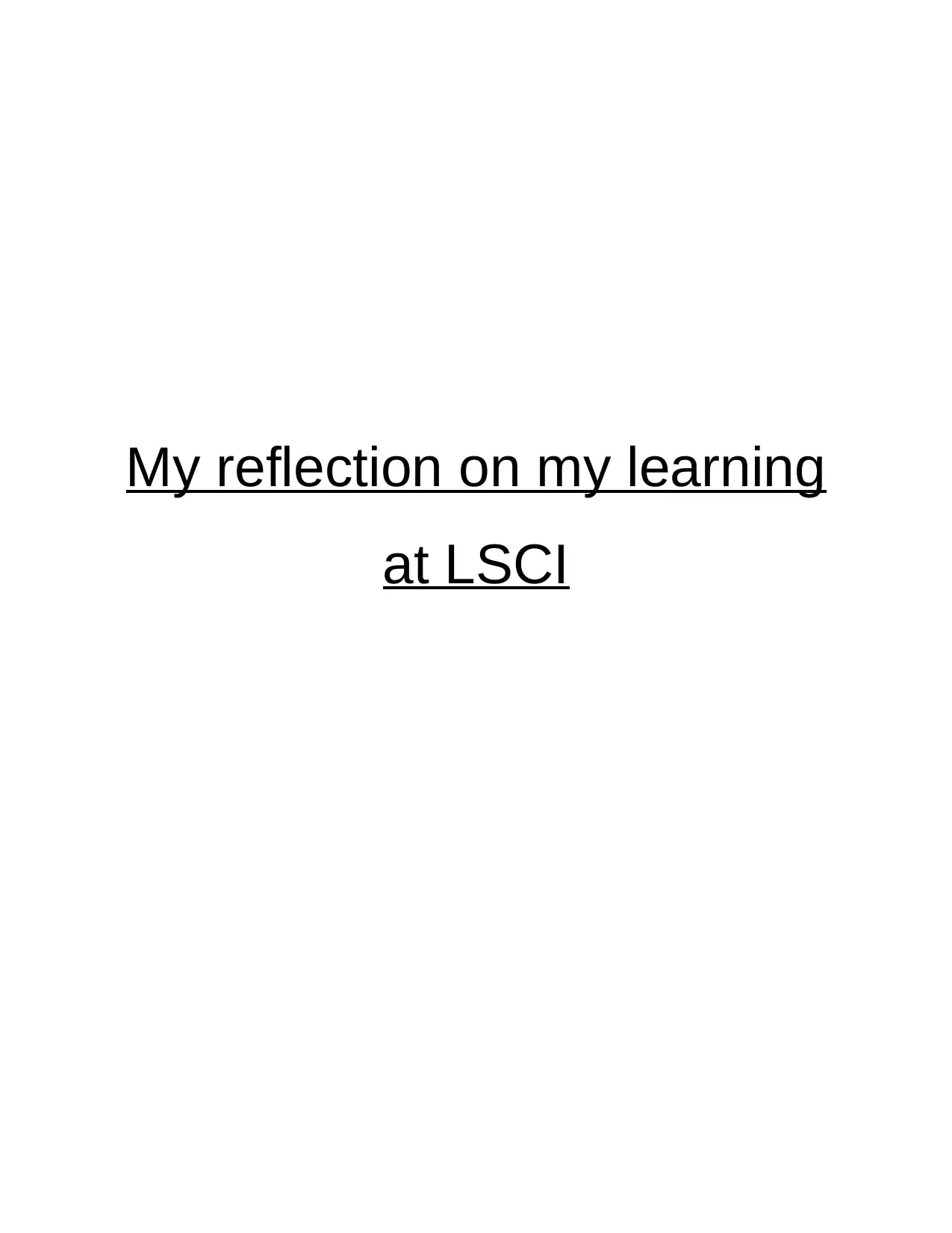
My reflection on my learning
at LSCI
at LSCI
Paraphrase This Document
Need a fresh take? Get an instant paraphrase of this document with our AI Paraphraser
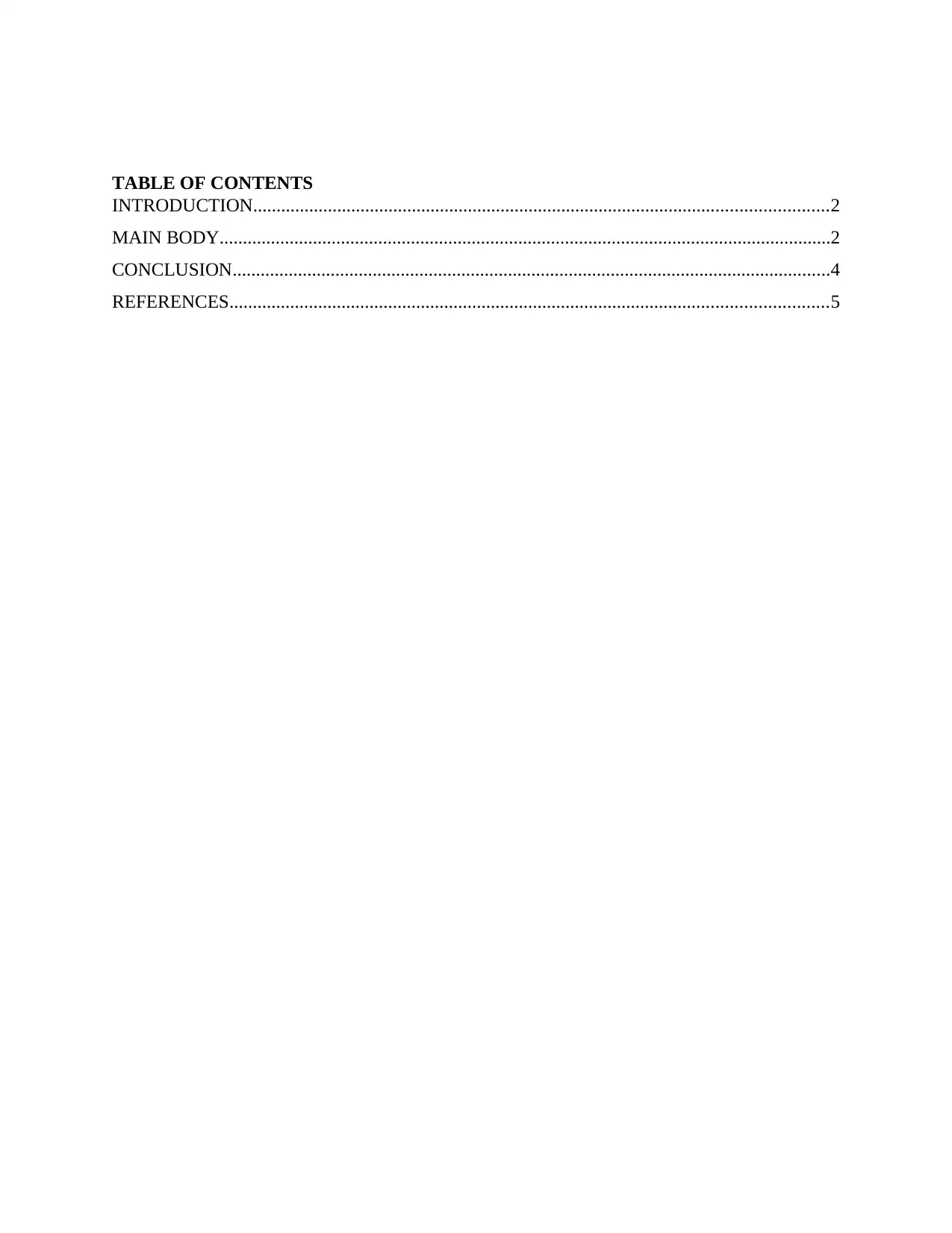
TABLE OF CONTENTS
INTRODUCTION...........................................................................................................................2
MAIN BODY...................................................................................................................................2
CONCLUSION................................................................................................................................4
REFERENCES................................................................................................................................5
INTRODUCTION...........................................................................................................................2
MAIN BODY...................................................................................................................................2
CONCLUSION................................................................................................................................4
REFERENCES................................................................................................................................5
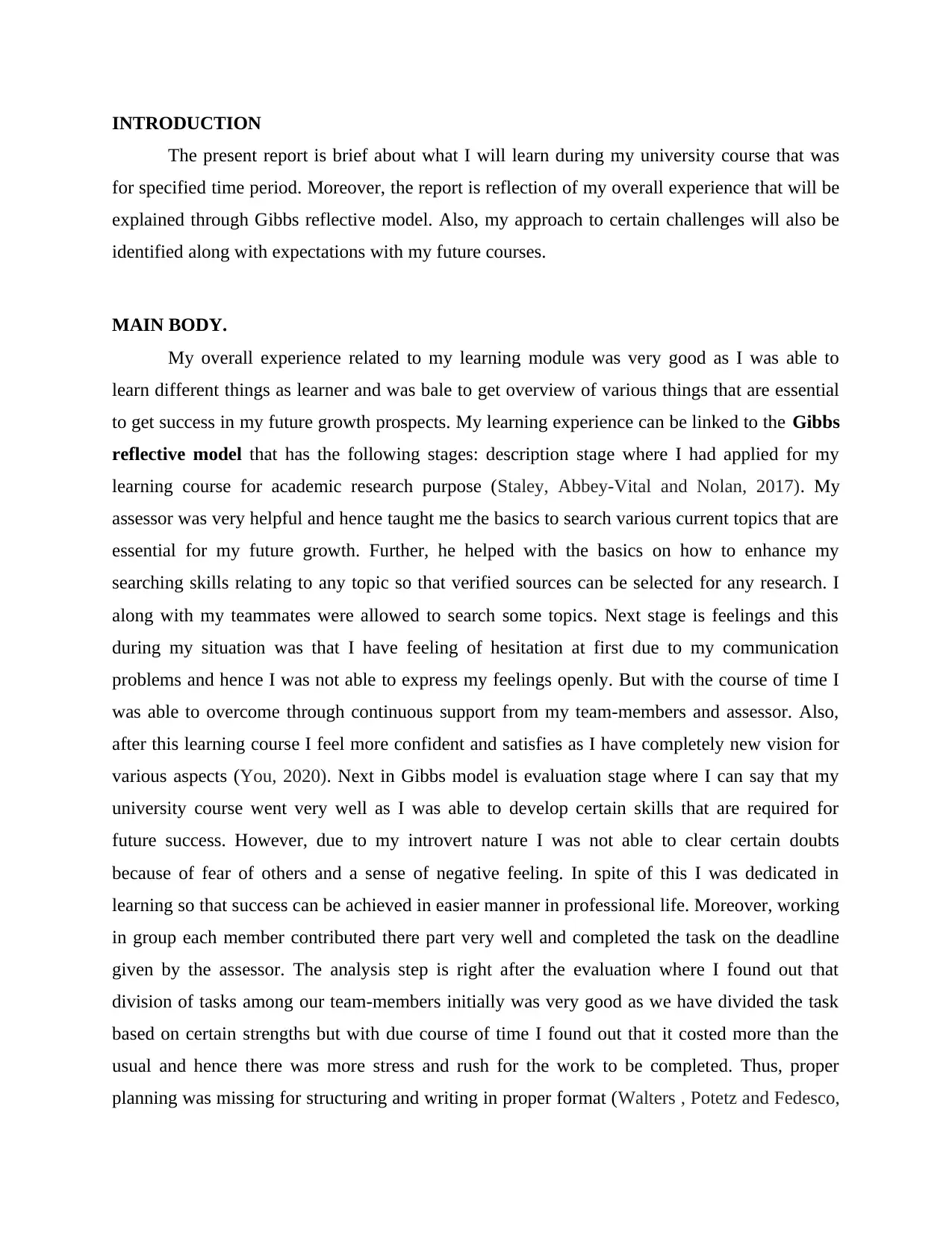
INTRODUCTION
The present report is brief about what I will learn during my university course that was
for specified time period. Moreover, the report is reflection of my overall experience that will be
explained through Gibbs reflective model. Also, my approach to certain challenges will also be
identified along with expectations with my future courses.
MAIN BODY.
My overall experience related to my learning module was very good as I was able to
learn different things as learner and was bale to get overview of various things that are essential
to get success in my future growth prospects. My learning experience can be linked to the Gibbs
reflective model that has the following stages: description stage where I had applied for my
learning course for academic research purpose (Staley, Abbey-Vital and Nolan, 2017). My
assessor was very helpful and hence taught me the basics to search various current topics that are
essential for my future growth. Further, he helped with the basics on how to enhance my
searching skills relating to any topic so that verified sources can be selected for any research. I
along with my teammates were allowed to search some topics. Next stage is feelings and this
during my situation was that I have feeling of hesitation at first due to my communication
problems and hence I was not able to express my feelings openly. But with the course of time I
was able to overcome through continuous support from my team-members and assessor. Also,
after this learning course I feel more confident and satisfies as I have completely new vision for
various aspects (You, 2020). Next in Gibbs model is evaluation stage where I can say that my
university course went very well as I was able to develop certain skills that are required for
future success. However, due to my introvert nature I was not able to clear certain doubts
because of fear of others and a sense of negative feeling. In spite of this I was dedicated in
learning so that success can be achieved in easier manner in professional life. Moreover, working
in group each member contributed there part very well and completed the task on the deadline
given by the assessor. The analysis step is right after the evaluation where I found out that
division of tasks among our team-members initially was very good as we have divided the task
based on certain strengths but with due course of time I found out that it costed more than the
usual and hence there was more stress and rush for the work to be completed. Thus, proper
planning was missing for structuring and writing in proper format (Walters , Potetz and Fedesco,
The present report is brief about what I will learn during my university course that was
for specified time period. Moreover, the report is reflection of my overall experience that will be
explained through Gibbs reflective model. Also, my approach to certain challenges will also be
identified along with expectations with my future courses.
MAIN BODY.
My overall experience related to my learning module was very good as I was able to
learn different things as learner and was bale to get overview of various things that are essential
to get success in my future growth prospects. My learning experience can be linked to the Gibbs
reflective model that has the following stages: description stage where I had applied for my
learning course for academic research purpose (Staley, Abbey-Vital and Nolan, 2017). My
assessor was very helpful and hence taught me the basics to search various current topics that are
essential for my future growth. Further, he helped with the basics on how to enhance my
searching skills relating to any topic so that verified sources can be selected for any research. I
along with my teammates were allowed to search some topics. Next stage is feelings and this
during my situation was that I have feeling of hesitation at first due to my communication
problems and hence I was not able to express my feelings openly. But with the course of time I
was able to overcome through continuous support from my team-members and assessor. Also,
after this learning course I feel more confident and satisfies as I have completely new vision for
various aspects (You, 2020). Next in Gibbs model is evaluation stage where I can say that my
university course went very well as I was able to develop certain skills that are required for
future success. However, due to my introvert nature I was not able to clear certain doubts
because of fear of others and a sense of negative feeling. In spite of this I was dedicated in
learning so that success can be achieved in easier manner in professional life. Moreover, working
in group each member contributed there part very well and completed the task on the deadline
given by the assessor. The analysis step is right after the evaluation where I found out that
division of tasks among our team-members initially was very good as we have divided the task
based on certain strengths but with due course of time I found out that it costed more than the
usual and hence there was more stress and rush for the work to be completed. Thus, proper
planning was missing for structuring and writing in proper format (Walters , Potetz and Fedesco,
⊘ This is a preview!⊘
Do you want full access?
Subscribe today to unlock all pages.

Trusted by 1+ million students worldwide
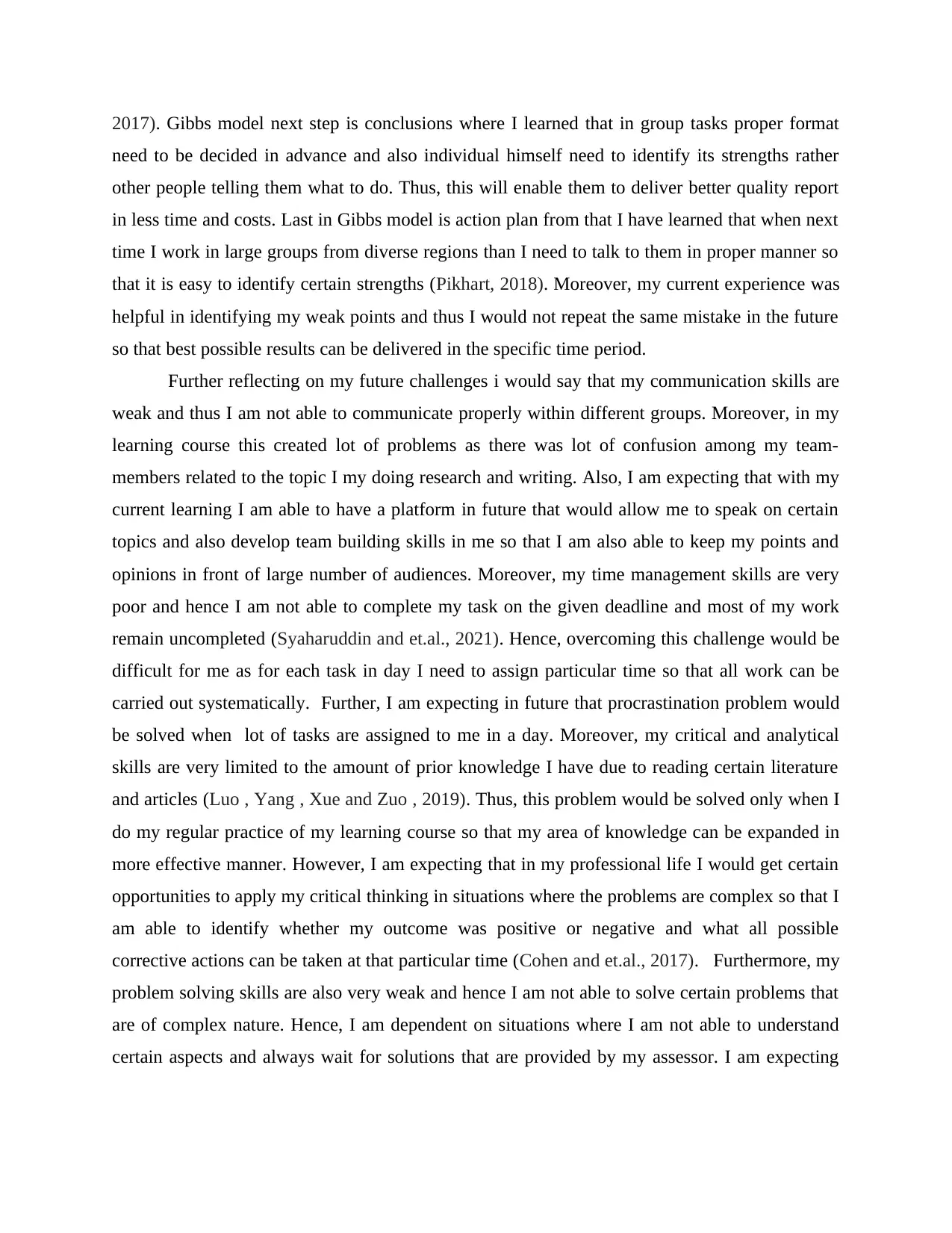
2017). Gibbs model next step is conclusions where I learned that in group tasks proper format
need to be decided in advance and also individual himself need to identify its strengths rather
other people telling them what to do. Thus, this will enable them to deliver better quality report
in less time and costs. Last in Gibbs model is action plan from that I have learned that when next
time I work in large groups from diverse regions than I need to talk to them in proper manner so
that it is easy to identify certain strengths (Pikhart, 2018). Moreover, my current experience was
helpful in identifying my weak points and thus I would not repeat the same mistake in the future
so that best possible results can be delivered in the specific time period.
Further reflecting on my future challenges i would say that my communication skills are
weak and thus I am not able to communicate properly within different groups. Moreover, in my
learning course this created lot of problems as there was lot of confusion among my team-
members related to the topic I my doing research and writing. Also, I am expecting that with my
current learning I am able to have a platform in future that would allow me to speak on certain
topics and also develop team building skills in me so that I am also able to keep my points and
opinions in front of large number of audiences. Moreover, my time management skills are very
poor and hence I am not able to complete my task on the given deadline and most of my work
remain uncompleted (Syaharuddin and et.al., 2021). Hence, overcoming this challenge would be
difficult for me as for each task in day I need to assign particular time so that all work can be
carried out systematically. Further, I am expecting in future that procrastination problem would
be solved when lot of tasks are assigned to me in a day. Moreover, my critical and analytical
skills are very limited to the amount of prior knowledge I have due to reading certain literature
and articles (Luo , Yang , Xue and Zuo , 2019). Thus, this problem would be solved only when I
do my regular practice of my learning course so that my area of knowledge can be expanded in
more effective manner. However, I am expecting that in my professional life I would get certain
opportunities to apply my critical thinking in situations where the problems are complex so that I
am able to identify whether my outcome was positive or negative and what all possible
corrective actions can be taken at that particular time (Cohen and et.al., 2017). Furthermore, my
problem solving skills are also very weak and hence I am not able to solve certain problems that
are of complex nature. Hence, I am dependent on situations where I am not able to understand
certain aspects and always wait for solutions that are provided by my assessor. I am expecting
need to be decided in advance and also individual himself need to identify its strengths rather
other people telling them what to do. Thus, this will enable them to deliver better quality report
in less time and costs. Last in Gibbs model is action plan from that I have learned that when next
time I work in large groups from diverse regions than I need to talk to them in proper manner so
that it is easy to identify certain strengths (Pikhart, 2018). Moreover, my current experience was
helpful in identifying my weak points and thus I would not repeat the same mistake in the future
so that best possible results can be delivered in the specific time period.
Further reflecting on my future challenges i would say that my communication skills are
weak and thus I am not able to communicate properly within different groups. Moreover, in my
learning course this created lot of problems as there was lot of confusion among my team-
members related to the topic I my doing research and writing. Also, I am expecting that with my
current learning I am able to have a platform in future that would allow me to speak on certain
topics and also develop team building skills in me so that I am also able to keep my points and
opinions in front of large number of audiences. Moreover, my time management skills are very
poor and hence I am not able to complete my task on the given deadline and most of my work
remain uncompleted (Syaharuddin and et.al., 2021). Hence, overcoming this challenge would be
difficult for me as for each task in day I need to assign particular time so that all work can be
carried out systematically. Further, I am expecting in future that procrastination problem would
be solved when lot of tasks are assigned to me in a day. Moreover, my critical and analytical
skills are very limited to the amount of prior knowledge I have due to reading certain literature
and articles (Luo , Yang , Xue and Zuo , 2019). Thus, this problem would be solved only when I
do my regular practice of my learning course so that my area of knowledge can be expanded in
more effective manner. However, I am expecting that in my professional life I would get certain
opportunities to apply my critical thinking in situations where the problems are complex so that I
am able to identify whether my outcome was positive or negative and what all possible
corrective actions can be taken at that particular time (Cohen and et.al., 2017). Furthermore, my
problem solving skills are also very weak and hence I am not able to solve certain problems that
are of complex nature. Hence, I am dependent on situations where I am not able to understand
certain aspects and always wait for solutions that are provided by my assessor. I am expecting
Paraphrase This Document
Need a fresh take? Get an instant paraphrase of this document with our AI Paraphraser
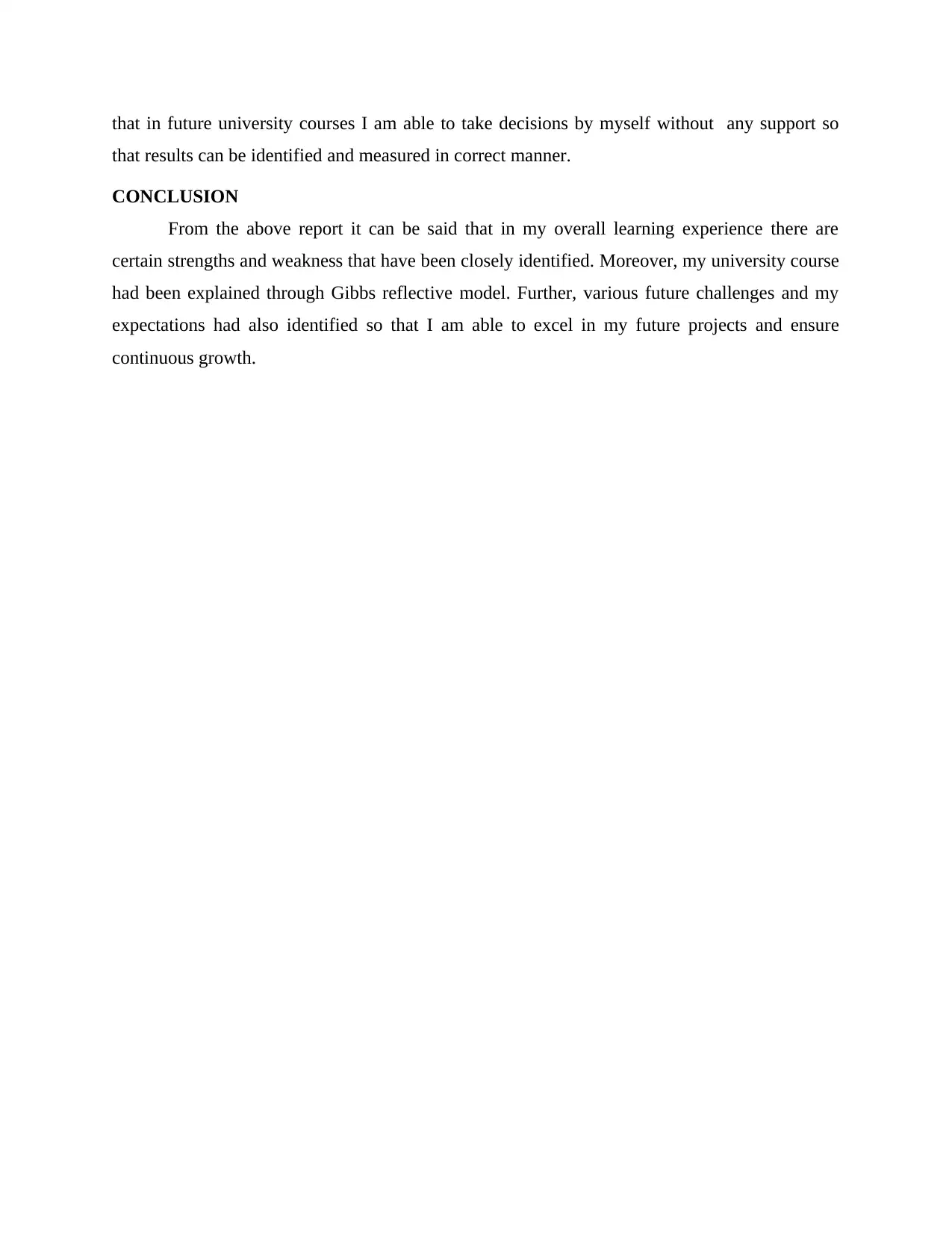
that in future university courses I am able to take decisions by myself without any support so
that results can be identified and measured in correct manner.
CONCLUSION
From the above report it can be said that in my overall learning experience there are
certain strengths and weakness that have been closely identified. Moreover, my university course
had been explained through Gibbs reflective model. Further, various future challenges and my
expectations had also identified so that I am able to excel in my future projects and ensure
continuous growth.
that results can be identified and measured in correct manner.
CONCLUSION
From the above report it can be said that in my overall learning experience there are
certain strengths and weakness that have been closely identified. Moreover, my university course
had been explained through Gibbs reflective model. Further, various future challenges and my
expectations had also identified so that I am able to excel in my future projects and ensure
continuous growth.
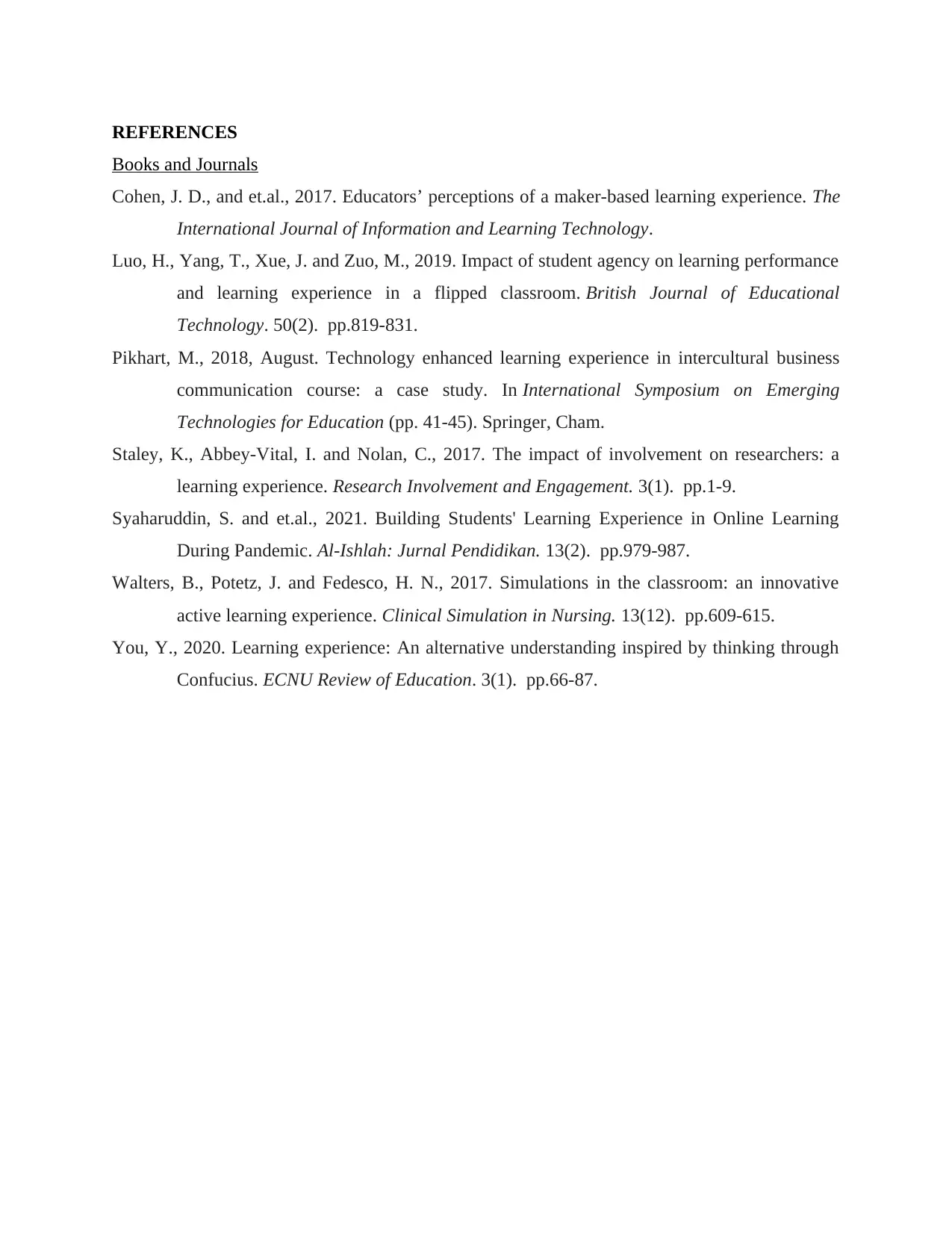
REFERENCES
Books and Journals
Cohen, J. D., and et.al., 2017. Educators’ perceptions of a maker-based learning experience. The
International Journal of Information and Learning Technology.
Luo, H., Yang, T., Xue, J. and Zuo, M., 2019. Impact of student agency on learning performance
and learning experience in a flipped classroom. British Journal of Educational
Technology. 50(2). pp.819-831.
Pikhart, M., 2018, August. Technology enhanced learning experience in intercultural business
communication course: a case study. In International Symposium on Emerging
Technologies for Education (pp. 41-45). Springer, Cham.
Staley, K., Abbey-Vital, I. and Nolan, C., 2017. The impact of involvement on researchers: a
learning experience. Research Involvement and Engagement. 3(1). pp.1-9.
Syaharuddin, S. and et.al., 2021. Building Students' Learning Experience in Online Learning
During Pandemic. Al-Ishlah: Jurnal Pendidikan. 13(2). pp.979-987.
Walters, B., Potetz, J. and Fedesco, H. N., 2017. Simulations in the classroom: an innovative
active learning experience. Clinical Simulation in Nursing. 13(12). pp.609-615.
You, Y., 2020. Learning experience: An alternative understanding inspired by thinking through
Confucius. ECNU Review of Education. 3(1). pp.66-87.
Books and Journals
Cohen, J. D., and et.al., 2017. Educators’ perceptions of a maker-based learning experience. The
International Journal of Information and Learning Technology.
Luo, H., Yang, T., Xue, J. and Zuo, M., 2019. Impact of student agency on learning performance
and learning experience in a flipped classroom. British Journal of Educational
Technology. 50(2). pp.819-831.
Pikhart, M., 2018, August. Technology enhanced learning experience in intercultural business
communication course: a case study. In International Symposium on Emerging
Technologies for Education (pp. 41-45). Springer, Cham.
Staley, K., Abbey-Vital, I. and Nolan, C., 2017. The impact of involvement on researchers: a
learning experience. Research Involvement and Engagement. 3(1). pp.1-9.
Syaharuddin, S. and et.al., 2021. Building Students' Learning Experience in Online Learning
During Pandemic. Al-Ishlah: Jurnal Pendidikan. 13(2). pp.979-987.
Walters, B., Potetz, J. and Fedesco, H. N., 2017. Simulations in the classroom: an innovative
active learning experience. Clinical Simulation in Nursing. 13(12). pp.609-615.
You, Y., 2020. Learning experience: An alternative understanding inspired by thinking through
Confucius. ECNU Review of Education. 3(1). pp.66-87.
⊘ This is a preview!⊘
Do you want full access?
Subscribe today to unlock all pages.

Trusted by 1+ million students worldwide
1 out of 6
Related Documents
Your All-in-One AI-Powered Toolkit for Academic Success.
+13062052269
info@desklib.com
Available 24*7 on WhatsApp / Email
![[object Object]](/_next/static/media/star-bottom.7253800d.svg)
Unlock your academic potential
Copyright © 2020–2026 A2Z Services. All Rights Reserved. Developed and managed by ZUCOL.




